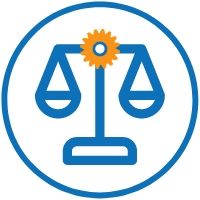The climate and equitable jobs act

CLEAN JOBS FOR CLIMATE JUSTICE
Creating a diverse and equitable clean energy workforce
EQUITABLE WORKFORCE DEVELOPMENT
The Climate and Equitable Jobs Act puts workers first. Its programs and initiatives are designed to ensure that the benefits of a thriving clean energy economy are shared by all Illinoisans. It builds on the successes from previous energy bills while remaining clear-eyed about the ways prior efforts have failed to build an equitable and diverse clean energy sector. CEJA recognizes and addresses structural, historical, and institutional barriers faced by Black, Indigenous, and People of Color (BIPOC) and low-income communities and job seekers and directs workforce development resources to counteract those barriers. CEJA dedicates nearly $100 million each year towards workforce development and Illinois Solar for All.
Creates and Connects Clean Jobs Workforce Hubs
Provides $26 million per year to create a network of workforce development hubs that provide direct support - from community education to workforce training to career placement - for BIPOC, low-income, and environmental justice communities, and for former fossil fuel workers.
Workforce development programs will be administered through 16 workforce hub sites across the state, including sites in the South Side of Chicago, the Southwest Side of Chicago, Waukegan, Rockford, Aurora, Joliet, Peoria, Champaign, Danville, Decatur, Carbondale, East St. Louis, and Alton. The remaining three workforce hub sites will be selected during CEJA’s implementation.
Convenes community representatives, labor organizations, state officials, and education leaders to build a comprehensive and standardized clean energy curriculum for workforce development programs.
Creates Contractor Incubator and Prime Contractor Accelerator Programs
Provides $21 million per year to provide BIPOC contractors with access to capital, support for obtaining insurance, assistance registering to become vendors for state incentive programs, connections with firms hiring contractors and subcontractors, and other vital services.
The BIPOC Prime Contractor Accelerator Program will incubate an advanced tier of businesses to lead clean energy projects as prime contractors. The program provides low interest loans, grants, and support services including operational support, mentorship, and technical assistance.
Creates Strong Connections to Illinois Solar for All
CEJA expands the Illinois Solar for All program budget to $50 million per year in order to increase solar projects in low-income and environmental justice communities, bringing projects and jobs closer to where they are most needed.
Directs the Illinois Power Agency (IPA) to ensure that all solar vendors hire workforce development program graduates and that small emerging contractors can participate as vendors in the program.
Creates a New Training in Prisons Program
Creates the Illinois Returning Residents Clean Jobs Training Program to prepare incarcerated people in the custody of the Department of Corrections for a career in clean energy. The curriculum covers both the hard and soft skills needed to be a competitive clean energy job applicant.
Prioritizes Equitable Hiring and Ownership
Gives companies meeting specified equity actions priority access to renewable energy, energy efficiency, and electric vehicle incentives. An equity point score system is used in competitive procurements and through program set-asides to reward companies that take some or all of the following actions: hire a minority workforce, are a disadvantaged business enterprise, meet equitable subcontracting requirements, hire workforce hub training graduates, are participants in the entrepreneurship and contractor incubator, are small businesses, have labor peace agreements, and create community benefits agreements.

How is it paid for?
The Energy Community Reinvestment Fund collects money through a small fee on fossil-fuel pollution and a 6% Coal Severance Fee on coal extraction. The fund supports the workforce programs, as well as the just transition in former fossil fuel communities in other parts of CEJA.

Why is it urgent?
We have created a thriving clean energy workforce in Illinois since the passage of the Future Energy Jobs Act in 2016. But this workforce does not currently reflect the diversity of Illinois, and key barriers to entry remain. CEJA’s programs and initiatives will empower workers and entrepreneurs who currently lack easy access to the energy sector, avoiding a situation where the renewable energy economy perpetuates current racial and socio-economic disparities.